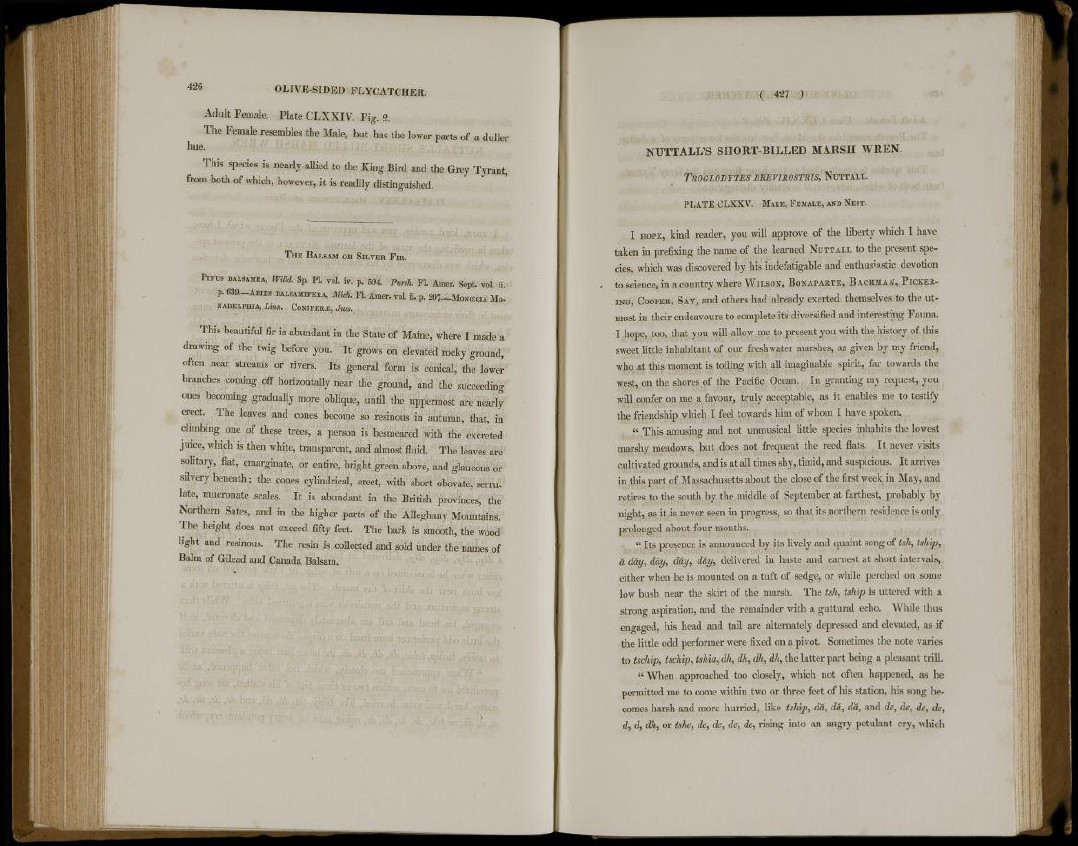
426 O L I V E - S I D E D F L Y C A T C H E R .
Adult Female. Plate CLXXIV. Fig. 2 .
The Female resembles the Male, but has the lower parts of a duller
hue.
This species is nearly allied to the King Bird and the Grey Tyrant,
from both of which, however, it is readily distinguished.
THE BALSAM OR SILVER FIR.
PINUS BALSAMEA, Willd. Sp. PI. vol. iv. p. 504. Pursh. Fl. Amer. Sept. vol. ii.
p. 039.—ABIES BALSAMIFERA, Mich. FL Amer. voL ii. p. 207—MONOXIA MONADELPHIA,
Linn. CON i r uit.i. Juss.
This beautiful fir is abundant in the State of Maine, where I made a
drawing of the twig before you. It grows on elevated rocky ground,
often near streams or rivers. Its general form is conical, the lower
branches coming off horizontally near the ground, and the succeeding
ones becoming gradually more oblique, until the uppermost are nearly
erect. The leaves and cones become so resinous in autumn, that, in
climbing one of these trees, a person is besmeared with the excreted
juice, which is then white, transparent, and almost fluid. The leaves are
solitary, flat, emarginate, or entire, bright green above, and glaucous or
silvery beneath; the cones cylindrical, erect, with short obovate, serrulate,
mucronate scales. It is abundant in the British provinces, the
Northern Sates, and in the higher parts of the Alleghany Mountains.
The height does not exceed fifty feet. The bark is smooth, the wood
light and resinous. The resin is collected and sold under the names of
Balm of Gilead and Canada Balsam.
( 427 )
NUTTALLS SHORT-BILLED MARSH WREN.
TROGLODYTES BREVIROSTRIS, NUTTALL.
P L A T E C L X X V . MALE, FEMALE, AND NEST.
I HOPE, kind reader, you will approve of the liberty which I have
taken in prefixing the name of the learned NUTTALL to the present species,
which was discovered by his indefatigable and enthusiastic devotion
to science, in a country where W I L S O N , BONAPARTE, BACHMAN, PICKERING,
COOPER, SAY, and others had already exerted themselves to the utmost
in their endeavours to complete its diversified and interesting Fauna.
I hope, too, that you will allow me to present you with the history of this
sweet little inhabitant of our freshwater marshes, as given by my friend,
who at this moment is toiling with all imaginable spirit, far towards the
west, on the shores of the Pacific Ocean. In granting my request, you
will confer on me a favour, truly acceptable, as it enables me to testify
the friendship which I feel towards him of whom I have spoken.
" This amusing and not unmusical little species inhabits the lowest
marshy meadows, but does not frequent the reed flats. It never visits
cultivated grounds, and is at all times shy, timid, and suspicious. It arrives
in this part of Massachusetts about the close of the first week in May, and
retires to the south by the middle of September at farthest, probably by
night, as it is never seen in progress, so that its northern residence is only
prolonged about four months.
" Its presence is announced by its lively and quaint song of tsh, tship,
a day, day, day, day, delivered in haste and earnest at short intervals,
either when he is mounted on a tuft of sedge, or while perched on some
low bush near the skirt of the marsh. The tsh, tship is uttered with a
strong aspiration, and the remainder with a guttural echo. While thus
engaged, his head and tail are alternately depressed and elevated, as if
the little odd performer were fixed on a pivot. Sometimes the note varies
to tschip, tschip, tshia, dh, dh, dh, dh, the latter part being a pleasant trill.
" When approached too closely, which not often happened, as he
permitted me to come within two or three feet of his station, his song becomes
harsh and more hurried, like tship, da, da, da, and de, de, de, de,
d, d, dh, or tslie, de, de, de, de, rising into an angry petulant cry, which